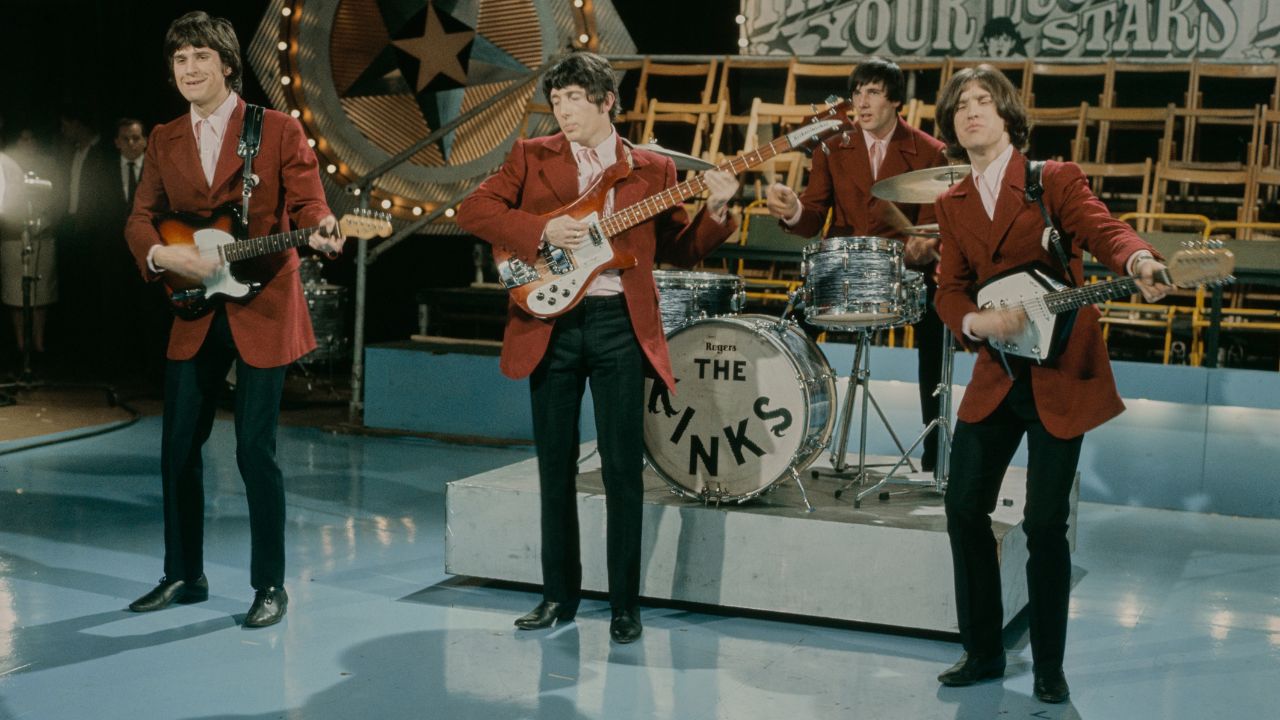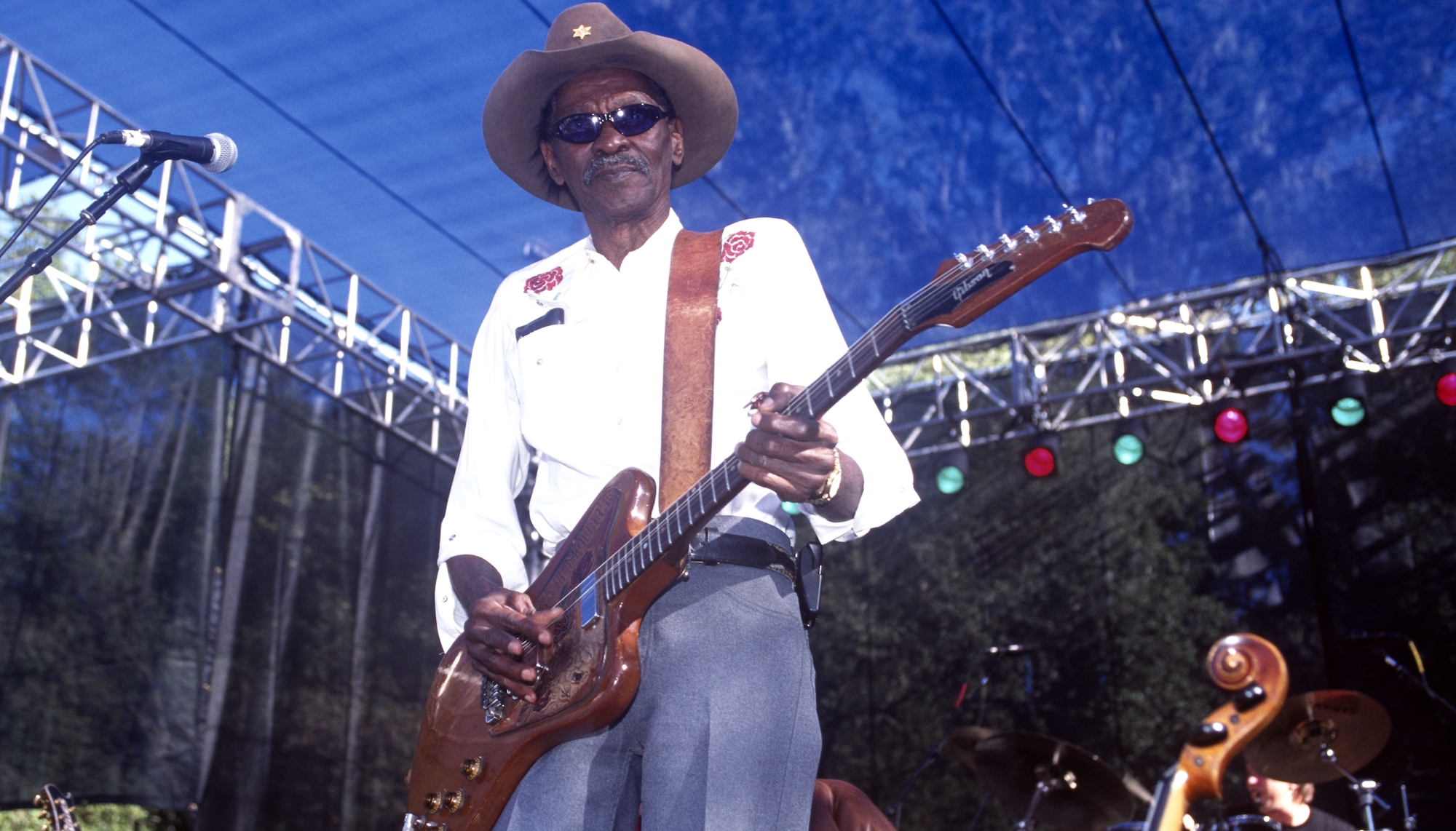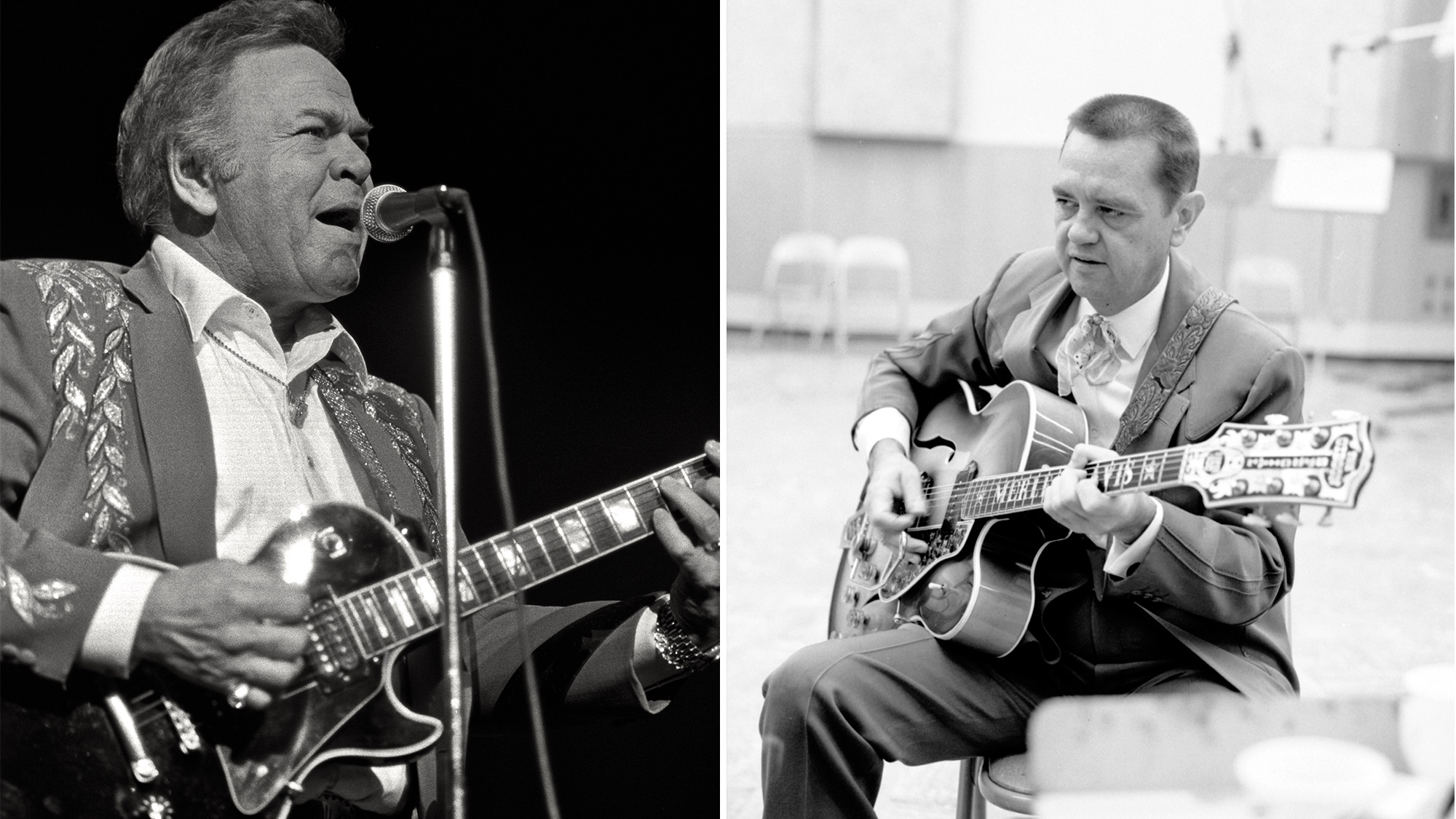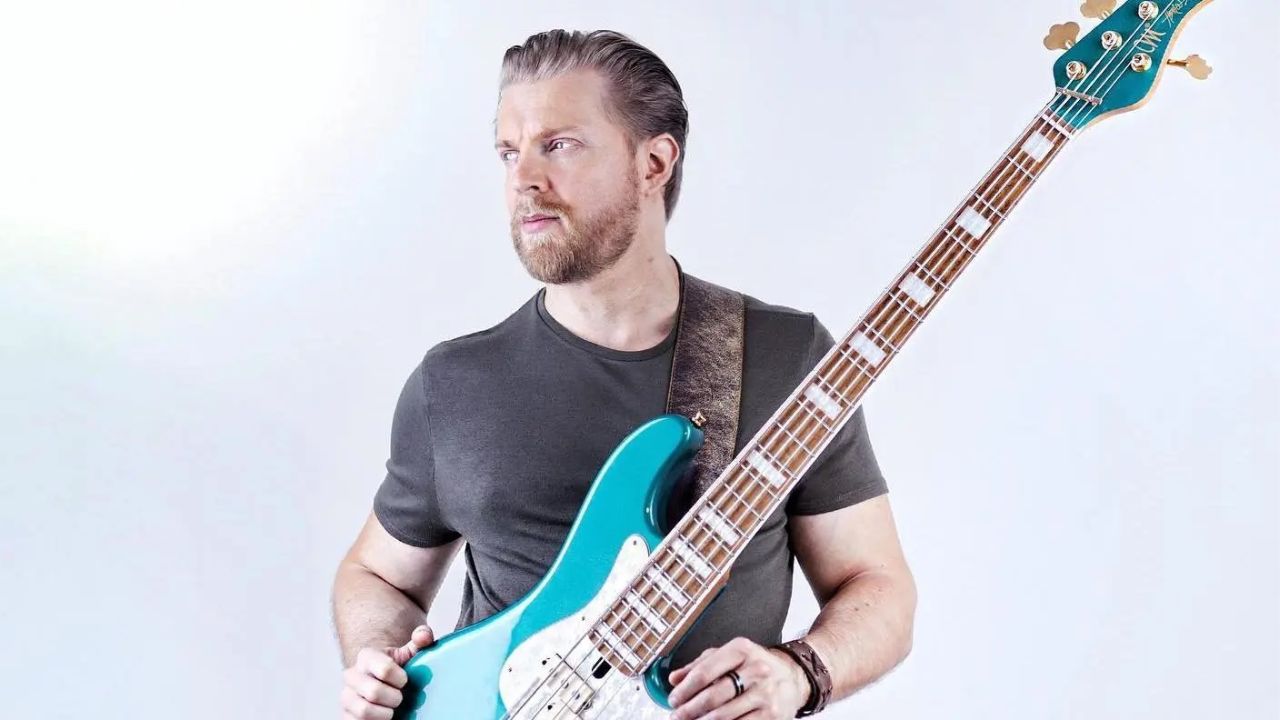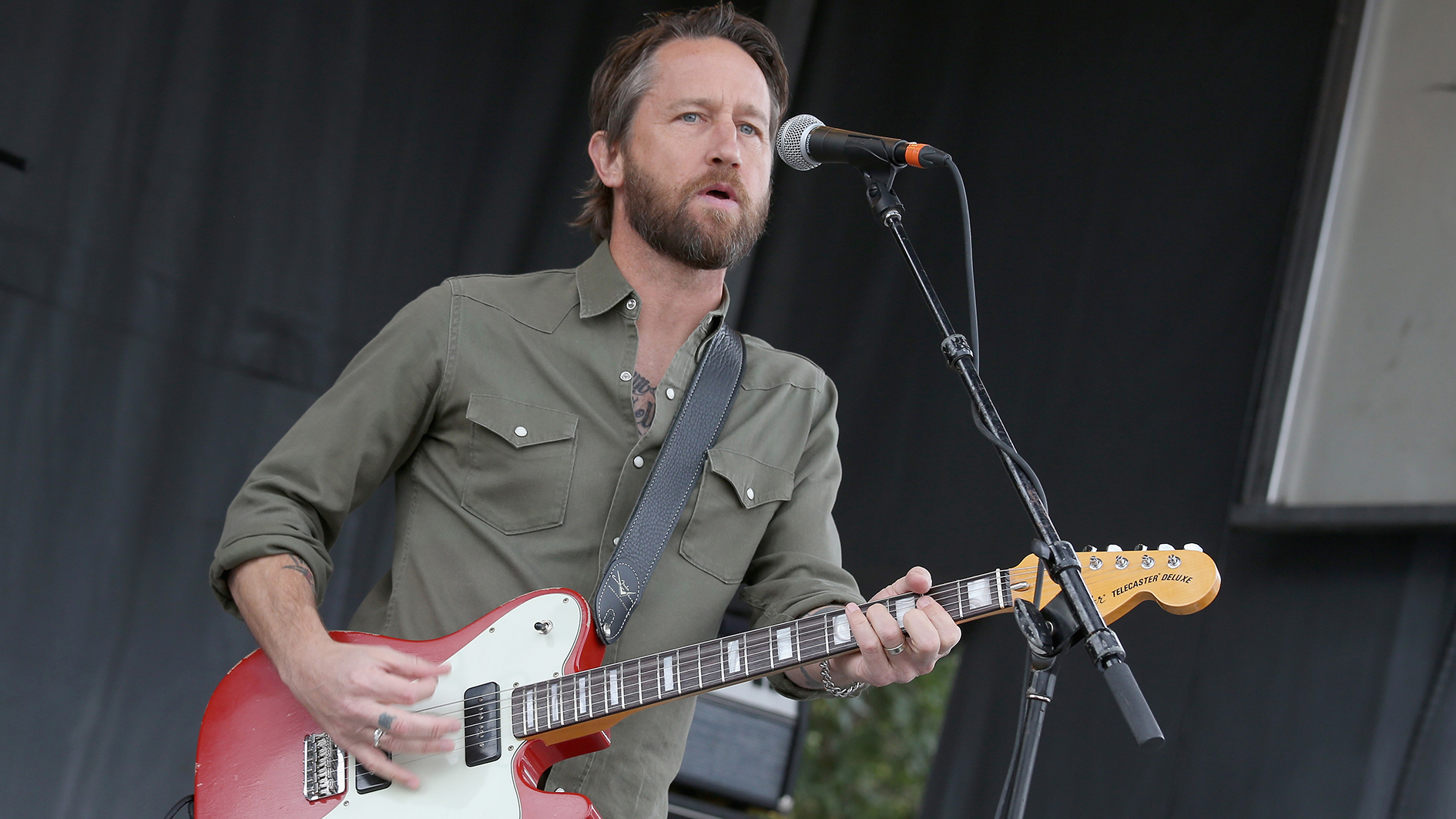
On a recent late-summer morning, Chris Shiflett is getting ready to hit the road. But in stark contrast to the luxurious private-jet mode of travel he usually enjoys in his day job as guitarist for the Foo Fighters, Shiflett (who recently released his second solo album, Hard Lessons) and his three-piece group will take to the nation’s highways in a van. Which suits him just fine.
“We’re just a bunch of dudes rolling down the road,” he says. “It’s how I started playing shows back in the day. And even while doing the Foo Fighters, I’ve done side bands and my own thing, so I’ve never strayed too far from the van thing. You just get in and it feels like second nature. I enjoy it.”
I’m a musician who’s also a husband and a father, so it’s all good. I know how fortunate I am on every level
Whether he’s cruising at 30,000 feet or barreling down a freeway, Shiflett is happy just knowing his destination is somewhere he can play music. At 48, he admits touring isn’t as easy on his body as it once was (“I get a few aches and pains that I never felt when I was younger”), but he’ll be the first to tell you he’s living a dream.
“I can still remember being 14 and wanting to do this,” he says. “On one hand, it’s nothing like what I imagined - there’s so much hard work involved in making anything happen - but on the other, it’s way better than what I saw in my head. I’m a musician who’s also a husband and a father, so it’s all good. I know how fortunate I am on every level.”
Foo Fighters fans who are unfamiliar with Shiflett’s solo output might find Hard Lessons as something of a surprise. There are hard-stomping arena rockers such as Liar’s Word and Welcome to Your First Heartbreak, but much of the album is bathed in gutsy, twangy, pedal steel-laced alt-country gems that wouldn’t sound out of place at the Grand Ole Opry (a stage Shiflett did, in fact, perform on last June).
Hard Lessons isn’t his first Americana rodeo; back in 2010, he formed the short-lived band Chris Shiflett and the Dead Peasants and released a pair of well-received albums that paid tribute to country rock.
But it wasn’t until he began collaborating with the Nashville-based uber-producer Dave Cobb, first on 2017’s West Coast Town and now on Hard Lessons, that he inhabited the genre in a way that felt like a true artistic breakthrough.
Get The Pick Newsletter
All the latest guitar news, interviews, lessons, reviews, deals and more, direct to your inbox!
Amid all the gloriously revved-up Bakersfield honky-tonkers, there’s also a fair amount of early '70s Stones permeating the album; gritty and greasy tracks like The Hardest Lessons and I Thought You’d Never Leave brim with unruly, interwoven guitar lines that harken back to Exile on Main St.
Before we even started recording, Dave said, 'Play like you’re a rock ‘n’ roll guitar player, but I don’t want you to play rock guitar.’ And that set the whole tone for the album
Shiflett credits Cobb, a diehard Rolling Stones aficionado, with encouraging this approach. “Dave has that whole sound down,” Shiflett says. “He lives and breathes that era of rock with a country vibe.
"I remember before we even started recording, he said, ‘I have a vision… Play like you’re a rock ‘n’ roll guitar player, but I don’t want you to play rock guitar.’ It took a second for that to set in, but then it made perfect sense, and that set the whole tone for the album.”
Shiflett produced the albums he recorded with the Dead Peasants, but he’s been content to turn over the reins to the Grammy-winning Cobb. “You can get lost making all the decisions when making a record, so it’s good to have somebody who can keep everything together,” Shiflett says.
“Dave doesn’t pull punches, but he can be kind of funny sometimes. He’s too nice of a guy to tell you something sucks. He’ll just say, ‘You don’t need that third verse - it’s got nothing.’ Or he’ll say, ‘That’s too complicated. Take out the fluff and you’ve got something.’ And that’s what I want in a producer. I don’t need compliments if it isn’t contributing to progress.”
The music you play in your solo career, particularly on this record - is it indicative of what you like to listen to in your private life?
"I listen to all kinds of stuff, a lot of country and Americana music, and of course, I listen to the Stones, Bowie, Clapton - all the rock ‘n’ roll that’s close to my heart. I just put it all in a blender - punk, rock and a little honky tonk - and it all gets mixed up together.
"I don’t go into making records with any sort of like boundaries. You can’t do that. As far as country music specifically, it’s a pretty wide umbrella, just like rock ‘n’ roll. What’s rock ‘n’ roll? That’s everything from Elvis Presley to what we do in the Foo Fighters and everything else in-between. The stuff I gravitate to pretty much comes from the era between the 1950s through the '80s. I like some newer stuff, but if I’m being honest, my ears are drawn to an earlier time."
When did your interest in country music start? Do you remember what lit the fuse?
I’ve hovered around Buck Owens and Merle Haggard songs enough to know that I want to live in that music and immerse myself in it
"It kind of evolved. You get a Johnny Cash record, and you’re like, 'Hmm, I kind of like that.' Then you go find Patsy Cline, and before you know it, you’re checking it all out.
"Funnily enough, I never attempted to play country music until we put together the Dead Peasants. We tried to do some country covers, but I couldn’t wrap my head around it at first. 'This is only three chords. What am I doing wrong?' As a guitar player, it took some time to figure it out.
"I plugged a Tele into a Deluxe Reverb and got comfortable with that tone. I know I’m not a country guitar player - I’m more rough around the edges than the real guys - but I’ve hovered around Buck Owens and Merle Haggard songs enough to know that I want to live in that music and immerse myself in it.
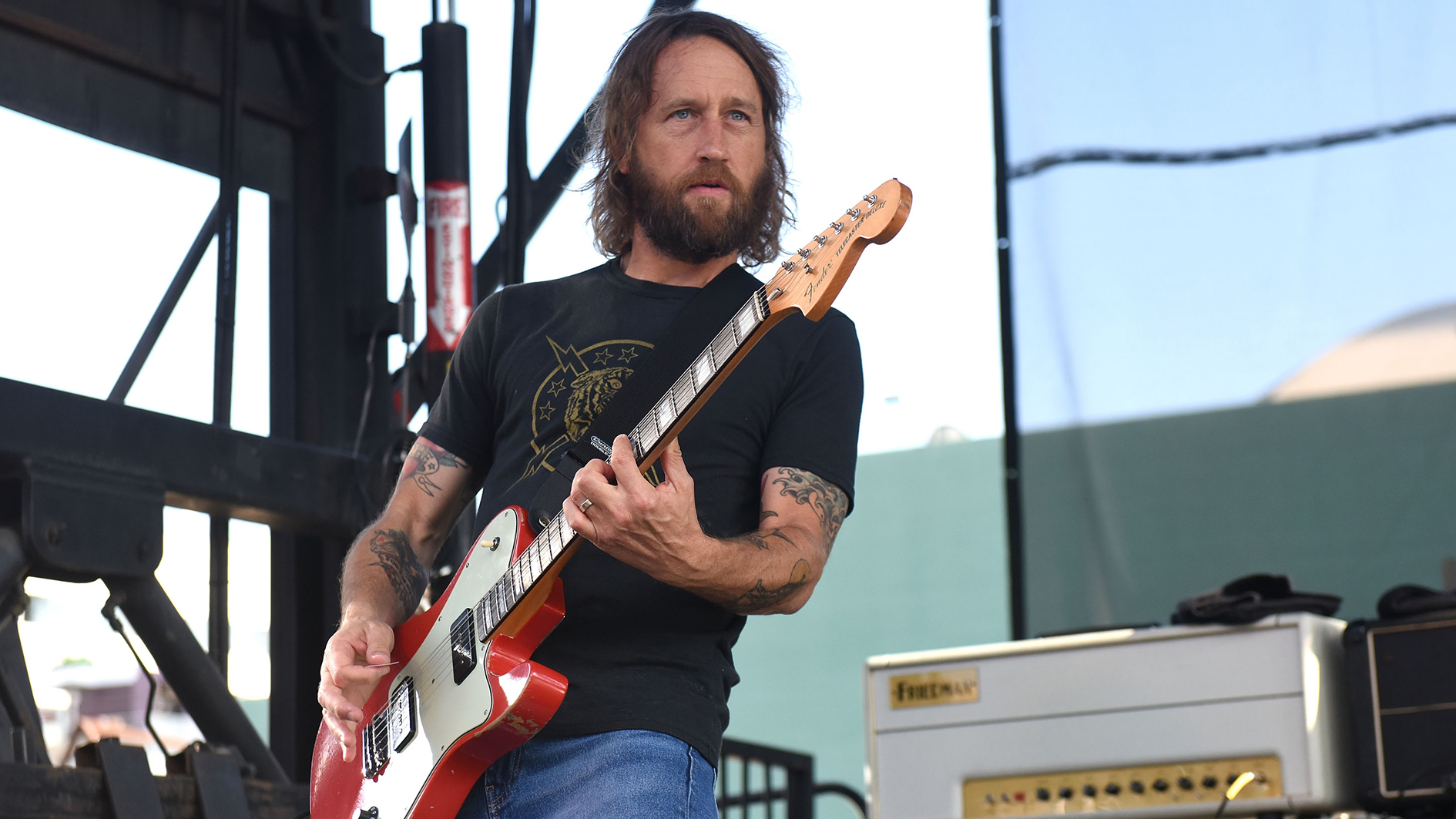
Do you notice that your finesse on the instrument changes from playing with the Foo Fighters to when you’re playing your solo material?
"Yeah, and a lot of that comes down to gear and tone. I’m playing with a smaller combo amp, and I’m using a lot less volume and gain. There are some things that are applicable to both styles of music that I play.
"I’m using a Masterbuilt version of my signature Tele that has P-90s in it, and I find that it works for this music and in the Foo Fighters. I also recorded most of this album with an old Marshall JCM800; that amp choice was Dave Cobb’s idea, and it really worked well.
Lyrically, there seem to be consistent themes throughout the album - isolation and abandonment. Have you noticed that?
"Funny you say that, because that’s exactly what I was writing. I think it’s because so much of the record was written when I was touring. I’d have a day off and I’d be in a hotel room on the other side of the world, and yeah, a lot of the lyrics were about that kind of sentiment. You just feel isolated from people. I’m missing my home, my wife and kids. You just get stuck in that mindset."
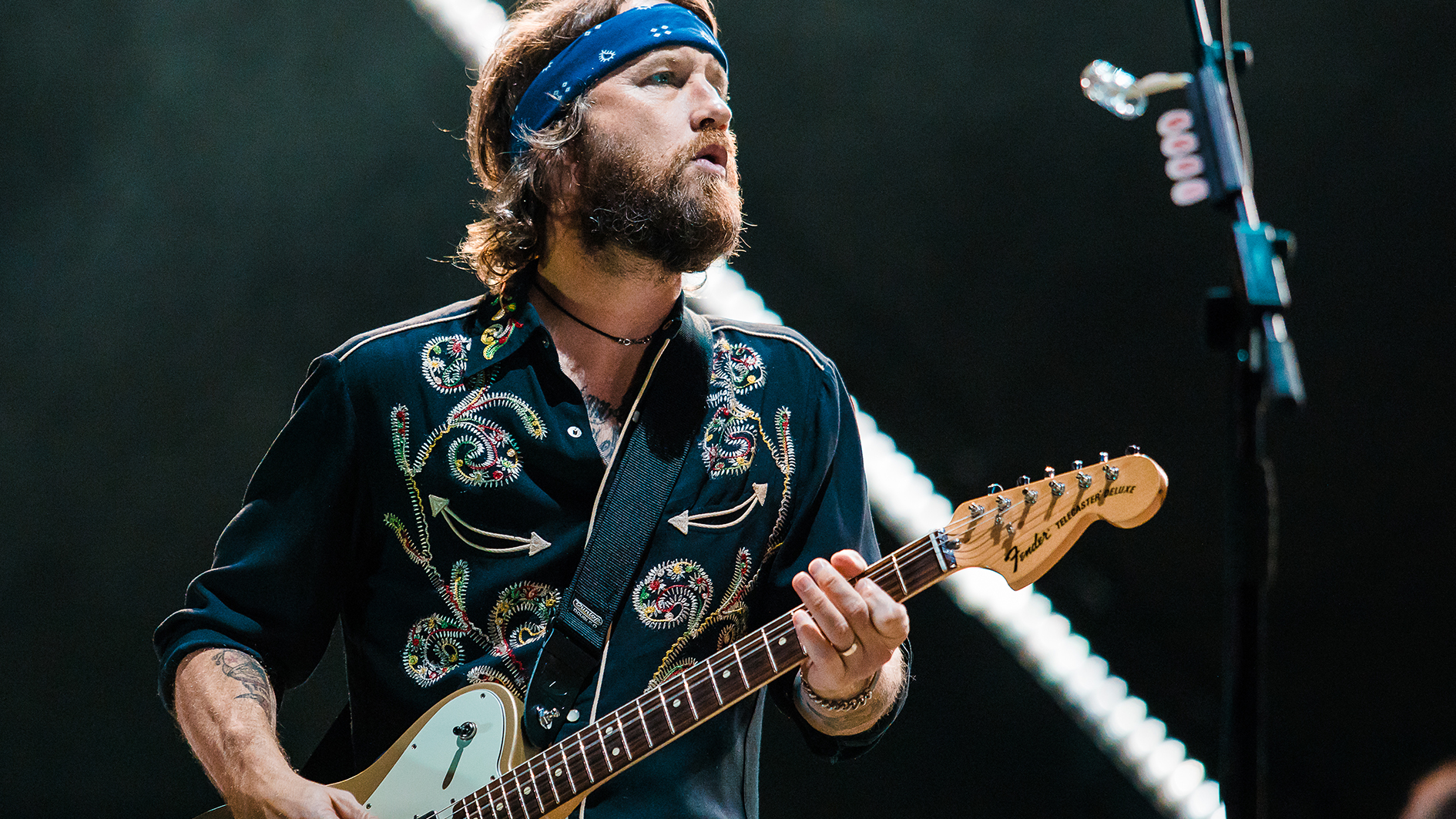
In the Foo Fighters, you’re one-third of a big guitar sound. Do you feel as though we hear your true guitar sound more on your individual solo albums?
"In a way. The guitar-playing difference, I think, probably stems from the fact that the Foo Fighters isn’t a band that has a lot of guitar solo-type stuff. That’s a big part of my playing, but I don’t do a lot of it. On my own stuff, I do a lot more of that, but it’s funny - you sort of run out of ideas. I hear myself playing guitar, and I start to think, 'Hmm, you need to get some other people in there.'
"I love having pedal steel solos on my records. Paul Franklin played on the new one, and Robbie Turner played on the one before. Those guys are amazing, and it’s so great to hear them just take off.
"On this record, my friend Little Joe [Laur Joamets] - he’s in Drivin’ N Cryin’, but he used to be Sturgill Simpson’s guitar player. He came in and played guitar solos on This Ol’ World. That’s fun for me. I love playing lead guitar, but it’s fun to watch other guys stretch out and fill the space."
Dave Cobb likes to use a lot of Nashville studio players. Between the two of you, who gets final say on the guitar tracks?
"I love working with Cobb’s guys. I remember when we started to make West Coast Town, he asked me if I had a band. I was like, 'No, it’s just me. Do you know some guys?' He’s said, 'Don’t even worry about it. I got it.'
"There’s so many great musicians in Nashville, and Dave knows the best of them. It’s awesome when we’re tracking in a room together - I’m not thinking about what the drummer and bass player are doing. I know they’ve got it. And that’s really helpful, because I don’t want to micromanage everything. I have enough to worry about trying to play and sing."
Dave is a great guitar player, and he always knows how to lay down a nice foundation to support the song
Dave plays some guitar on this album. What are the instances where he’ll pick up the guitar and do something himself?
"He plays all the acoustic on my records. When we track, it’s me singing and playing scratch electric guitar, Dave is on acoustic guitar, Chris Powell is on drums, and Brian Allen is on bass. Then we’ll do guitar overdubs - the more elite-type stuff - and we’ll work on the tracks some more. Dave is a great guitar player, and he always knows how to lay down a nice foundation to support the song."
This Ol’ World has a pretty blitzing middle solo, and there’s some wild dueling guitars at the end. Who’s playing all of those parts?
"Well, I take the first solo, and Little Joe takes the second one. Then it’s Paul Franklin, and then it’s me again, and then Paul Franklin closes it out. I think probably more than half of that song is guitar solos. I had a great time with that one. It’s so inspiring hearing those guys knock it out of the park."
You don’t do so bad yourself. Is that you playing the slide solo on Liar’s Word?
"That’s me."
Pretty great. For something like that, do you have it all played out, or are you winging it?
"A little bit of both. I like guitar solos that are a part of the song; they’re connected to it, but at the same time, they have their own kind of spark. Sometimes you hit on that quickly; other times, you have to sit there and work on it till you find it."
I Thought You’d Never Leave and Weak Heart have pretty dynamite riffs. Do you have any kind of riff formula?
"Not so much. I might be sitting on the couch watching TV - I’ll noodle around and then I’ll hit on something. Then I grab my phone, record it and try to turn it into something. It doesn’t always pan out, but when it does it’s amazing. Weak Heart was definitely one of those times. I was noodling around, repeating this lick, and I went. 'Oh, fuck, I think I might have a tune.'"
I love what you’re doing at the end of the record - you reprise the guitar jam from The Hardest Lessons.
"Yeah, if you listen to The Hardest Lessons, it goes into this jam that fades out. I thought it would be cool to bring it back at the end of the record. I always loved that with old records, like on the Ozzy’s Diary of a Madman - it fades out just as the lead playing is getting better and better. You’d have to crank it up to hear the best bits."
Last year, you sold 20 guitars. Any regrets?
If I’m looking at a vintage guitar, I’ll usually take a picture of it, text it to Dave, and go, 'Should I get this thing?' He knows so much more about guitars than I do
"Not at all. I had too many guitars. I still have too many! I was never a vintage guy. I mean, I like vintage guitars, but I could never see spending big money on guitars that you don’t take out on the road. I like workhorse guitars that I can take out and play.
"I did get a pretty cool guitar recently… I went into Chicago Music Exchange and found a guitar that started off as a ’57 goldtop with two original PAFs. Somebody took the paint off, so now it’s blonde. It’s a great guitar."
Are there any go-to guitars that you used on the new record?
"I used my Fender signature model, the Masterbuilt gold one. I go to the studio with a few things, but honestly, I always wind up using a lot of Dave Cobb’s stuff. He has a 1957 gold-top that I played quite a bit. There were some other Teles, but I’m not sure about the dates.
"I bought a few of Dave’s guitars - a 12-string acoustic and a killer old P-Bass. And I bought an Esquire and an old Sixties Tele from him. If I’m looking at a vintage guitar, I’ll usually take a picture of it, text it to him, and go, 'Should I get this thing?' He knows so much more about guitars than I do.
After all these years, is there anything you wish you could play on the guitar that you still can’t?
"[Laughs] Absolutely! I mean, shit, I wish I could play like Eddie Van Halen, but I think that’s an unattainable goal.
"I take lessons from time to time. I’m always trying to figure out other people’s licks and just work on my guitar playing. But that’s the beauty of it all - you’re always evolving on the instrument. If you love it, it’s just part of the game..."
Joe is a freelance journalist who has, over the past few decades, interviewed hundreds of guitarists for Guitar World, Guitar Player, MusicRadar and Classic Rock. He is also a former editor of Guitar World, contributing writer for Guitar Aficionado and VP of A&R for Island Records. He’s an enthusiastic guitarist, but he’s nowhere near the likes of the people he interviews. Surprisingly, his skills are more suited to the drums. If you need a drummer for your Beatles tribute band, look him up.
“Chuck Berry's not a very good guitar player. He's a clown. He runs all over the guitar, just like any one of these old rock players would do, and makes no sense”: Clarence “Gatemouth” Brown pulled no punches when speaking about his fellow guitar heroes
“I said, ‘Merle, do you remember this?’ and I played him his song Sweet Bunch of Daisies. He said, ‘I remember it. I've never heard it played that good’”: When Roy Clark met his guitar hero

